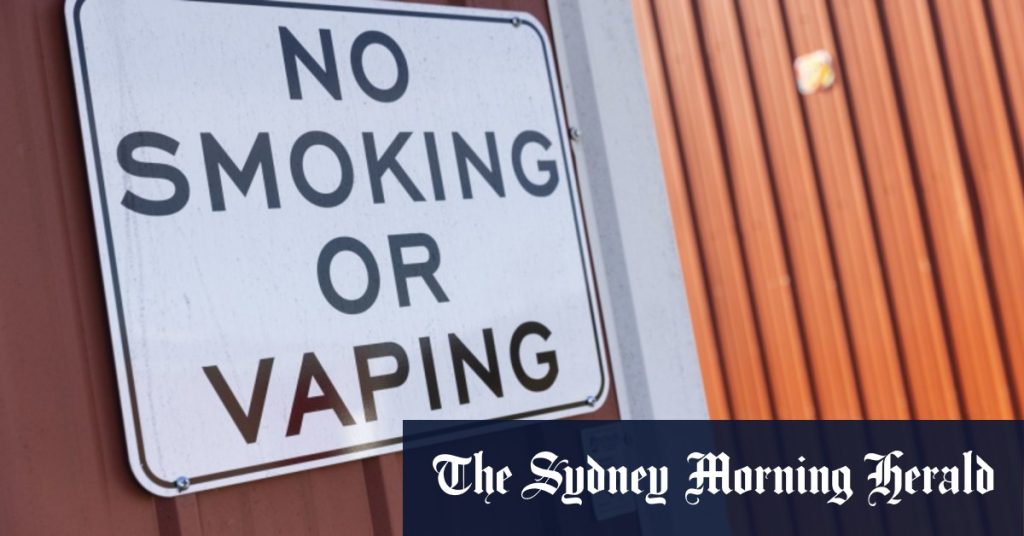The Queensland government is grappling with a burgeoning black market for illegal tobacco and vaping products, particularly in regional areas. Attorney General Deb Frecklington has expressed serious concern over the proliferation of these illicit operations and has initiated a departmental review to explore enforcement options. The situation has escalated to the point where Ms. Frecklington has vowed to make it a key focus of her agenda, promising further pronouncements on the issue. The government’s apprehension stems from the increasing prevalence of these illegal vendors across the state, raising alarms about the potential health risks and economic implications. The black market undermines legitimate businesses, deprives the state of tax revenue, and exposes consumers to potentially unsafe products. The current regulatory framework, while seemingly robust, is struggling to keep pace with the rapidly evolving tactics of illicit traders.
The gravity of the situation is underscored by the involvement of multiple government agencies, including Queensland Health, which acts as the primary regulator in this area. Health Minister Yvette D’Ath maintains that the department adopts a “zero-tolerance approach” towards illegal tobacco and vaping products. She cites existing legislation and enforcement efforts as instrumental in curbing the illicit trade, pointing to significant seizures of illegal cigarettes, loose tobacco, vapes, and nicotine pouches. These actions, according to the Minister, have disrupted supply chains, forced price increases, and led to the closure of some retailers specializing in illicit vaping products. However, the continued presence and growth of the black market suggest that more robust measures are required to effectively combat the issue.
A recent 12-week operation conducted by Queensland Health provides a snapshot of the scale of the problem. This blitz resulted in the seizure of over 5.2 million cigarettes, 1.2 tonnes of loose tobacco, 8,500 illegal vapes, and 12,000 nicotine pouches. These figures highlight the widespread availability of these products and the significant logistical challenges involved in their distribution. Furthermore, the involvement of organized crime casts a darker shadow over the issue, adding another layer of complexity to enforcement efforts. The infiltration of legitimate supply chains, as evidenced by the alleged involvement of Australia Post contractors in a cigarette smuggling operation, underscores the sophistication of these criminal networks and their ability to exploit vulnerabilities in existing systems.
The dominance of organized crime in this illicit market is estimated to be around 75%, highlighting the need for a more coordinated and targeted approach involving law enforcement agencies beyond Queensland Health. The December incident involving Australia Post contractors, where a plot to import over half a million illegal cigarettes was uncovered, illustrates the extent to which criminal organizations are willing to go to circumvent regulations. This incident exposed a vulnerability within the postal service, demonstrating how seemingly secure channels can be exploited for illicit purposes. It also underscores the need for enhanced security measures and greater vigilance within these organizations to prevent their unwitting participation in illegal activities.
The government’s current efforts, while yielding some results, appear insufficient to stem the tide of illegal tobacco and vaping products flooding the market. The scale of the seizures indicates a thriving black market, fueled by high demand and facilitated by organized crime. The Attorney General’s commitment to exploring further options suggests a recognition of the need for stronger measures. This might involve reviewing existing legislation, strengthening enforcement powers, increasing penalties for offenders, and enhancing collaboration between different government agencies and law enforcement bodies. Furthermore, public awareness campaigns could play a crucial role in educating consumers about the risks associated with purchasing these products from unregulated sources.
Addressing this complex issue requires a multi-pronged approach that encompasses legislative reform, enhanced enforcement, targeted disruption of organized crime networks, and public education initiatives. The Queensland government’s commitment to tackling this problem is a positive step, but the scale and complexity of the black market demand a sustained and comprehensive strategy to effectively protect public health and the integrity of the legal market. The ongoing review of enforcement options, coupled with increased public attention to this issue, provides an opportunity to develop and implement more effective measures to combat this growing threat. The long-term success of these efforts will depend on the government’s ability to adapt and respond to the constantly evolving tactics employed by those operating within this illicit market.

